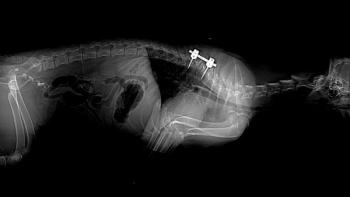
- Vetted January 2019
- Volume 114
- Issue 1
Can I use coconut oil as Fifis fat source?
If questions about coconut oil are popping up in your exam room, just a spoonful of advice from veterinary nutritionist Dr. Angela Rollins should help give you some direction.
At a recent
“I often have clients ask me if they can use coconut oil as their pet's fat source,” she said. “I have to tell them no, because it lacks essential fatty acids like omega-3 and omega-6 fatty acids.”
And while the addition of coconut oil to a pet's diet has been anecdotally linked to all sorts of health benefits (including improved cognitive function and reduced joint inflammation), Dr. Rollins said that because there haven't been any studies evaluating the benefits of coconut oil in dogs or cats, we simply don't have the scientific evidence to support these claims.
Can an MCT diet decrease seizure frequency?
Twenty-one chronically antiepileptic drug-treated dogs with idiopathic epilepsy participated in a six-month randomized, double-blinded study designed to compare a medium-chain triglyceride diet with a standardized placebo diet.1 Seizure frequency and seizure day frequency were found to be significantly lower when dogs were fed the MCT diet, suggesting it's possible use as a therapeutic option for epilepsy treatment.1
The same applies to using coconut oil to control seizures. Dr. Rollins said that although coconut oil is high in medium-chain triglycerides (MCTs), which have recently received attention as a potential treatment for dogs with seizure disorders (see sidebar),1 the MCTs found in coconut oil differ from those used in the study.
“The primary MCT in coconut oil is lauric acid,” she explained, “and the studies that have been done in dogs with seizure disorders have used capric and caprylic acid. So for that reason, I wouldn't say, ‘Hey, you can just give coconut oil and that may help with seizures.' We just don't know, because no one has done these studies with lauric acid.”
Dr. Rollins stressed that she isn't closed off to the idea of recommending coconut oil for seizures and other internal ailments someday, but she wants to wait for the proof-especially since coconut oil is 90% saturated fats, and conventional wisdom would suggest taking a cautionary approach to ingesting any oil that's a solid at room temperature. In the meantime, this might require some flexibility with the client who's absolutely certain that his dog needs coconut oil in its diet.
When an attendee asked what she should tell such clients, Dr. Rollins was ready with a suggestion: “Go with a teaspoon a day. As long as you don't induce pancreatitis, a small amount should be fine.”
Reference
1. Law TH, Davies ES, Pan Y, et al. A randomised trial of a medium-chain TAG diet as treatment for dogs with idiopathic epilepsy. Br J Nutr 2016;115(9):1438-1447.
Articles in this issue
almost 7 years ago
Counter cost concerns with heartworm treatmentalmost 7 years ago
An OTC way to keep pets calm and carry onabout 7 years ago
3 New Years resolutions for practice managersabout 7 years ago
Cytology sample results in 47 minutes? Yep.about 7 years ago
Veterinary dentistry wins: The perfect surgical flapabout 7 years ago
Feline behavior modifications that actually workabout 7 years ago
Going above and beyond NSAIDs to banish pain and inflammationNewsletter
From exam room tips to practice management insights, get trusted veterinary news delivered straight to your inbox—subscribe to dvm360.




